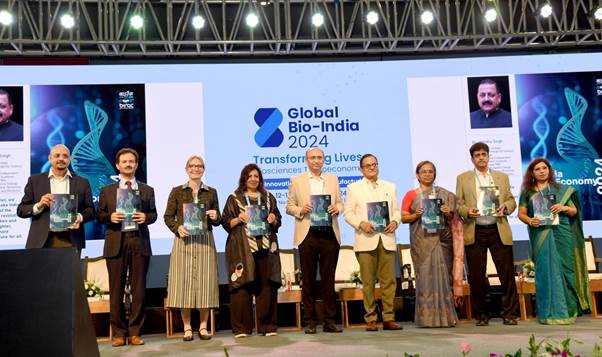New Delhi: Global Bio India 2024 kicked off today at Pragati Maidan with the unveiling of 30 groundbreaking biotech startups, highlighting India’s emergence as a global biotech powerhouse. Union Minister Dr. Jitendra Singh, who presided over the inaugural ceremony, emphasized the event’s significance in shaping the future of biotechnology and congratulated the Department of Biotechnology (DBT) and Biotechnology Industry Research Assistance Council (BIRAC) for their pivotal role in fostering the country’s biotech growth.
“India’s bio-economy has experienced phenomenal growth, skyrocketing from $10 billion in 2014 to over $130 billion in 2024, with projections to reach $300 billion by 2030,” Dr. Singh said. He attributed this growth to the visionary leadership of Prime Minister Narendra Modi, who he described as a champion of the new biotech boom, which promises to boost the economy, drive innovation, create jobs, and reinforce environmental sustainability.
India’s Rising Bio-Economy and Global Leadership
The minister highlighted the recently released India Bio Economy Report 2024, which captures the rapid advancements in India’s biotech sector. He noted that the Global Bio India (GBI) event serves as a unique business networking platform, bringing together stakeholders from across the world, including startups, large industries, investors, research institutes, and policy makers.
“This year’s Global Bio India is bigger and better than 2023, with participation from over 30 countries, 500 exhibitors, 1,000 startups, and 5,000 delegates. The event is set to facilitate key meetings and collaborations, including business-to-business (B2B), business-to-government (B2G), and government-to-government (G2G) engagements,” Dr. Singh remarked.
He highlighted that India accounts for 60% of global vaccine production and has the second-highest number of USFDA-approved manufacturing plants outside the United States, making it a leading destination for investments in sectors such as bio-pharma, bio-agriculture, bio-industrial, bio-energy, and med-tech.
Bio-Revolution in India: The Next Frontier
Comparing India’s biotechnology revolution to the IT revolution of the West, Dr. Singh introduced the recently approved BioE3 Policy (Biotechnology for Economy, Employment, and Environment), which aims to accelerate the growth of India’s bioeconomy while addressing global climate challenges. “This policy is a timely intervention that will help create a cleaner, greener, and more prosperous India,” he stated.
Key areas of focus under the BioE3 Policy include bio-based chemicals and enzymes, smart proteins, precision biotherapeutics, climate-resilient agriculture, carbon capture, and advanced marine and space research. These innovations, according to Dr. Singh, will drive growth and revolutionize industries by fostering collaboration between startups, SMEs, and established companies.
Cutting-Edge Infrastructure and Job Creation
The BioE3 Policy will also support the development of state-of-the-art biomanufacturing facilities, bio-foundry clusters, and Bio-AI hubs, enabling the integration of AI to analyze large-scale biological data. This, Dr. Singh noted, will pave the way for advancements in gene therapies and food processing, while bridging the gap between research and commercial manufacturing.
Dr. Singh emphasized the employment opportunities being created through these initiatives, particularly in tier-II and tier-III cities, where biomanufacturing hubs will utilize local resources and contribute to regional economic development, promoting more inclusive growth.





